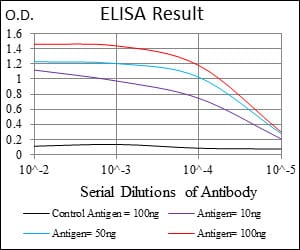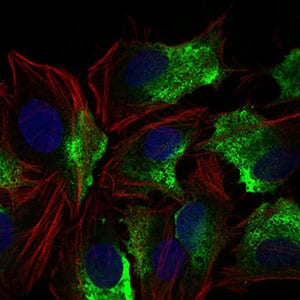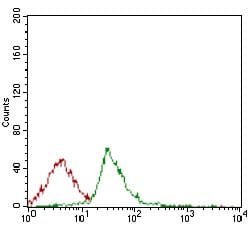



| WB | 1/500 - 1/2000 | Human,Mouse,Rat |
| IF | 咨询技术 | Human,Mouse,Rat |
| IHC | 咨询技术 | Human,Mouse,Rat |
| ICC | 1/200 - 1/1000 | Human,Mouse,Rat |
| FCM | 1/200 - 1/400 | Human,Mouse,Rat |
| Elisa | 1/10000 | Human,Mouse,Rat |
| Aliases | II; DHLAG; HLADG; Ia-GAMMA |
| Entrez GeneID | 972 |
| clone | 2D1B3 |
| WB Predicted band size | 33.5kDa |
| Host/Isotype | Mouse IgG1 |
| Antibody Type | Primary antibody |
| Storage | Store at 4°C short term. Aliquot and store at -20°C long term. Avoid freeze/thaw cycles. |
| Species Reactivity | Human |
| Immunogen | Purified recombinant fragment of human CD74 (AA: 1-106) expressed in E. Coli. |
| Formulation | Purified antibody in PBS with 0.05% sodium azide |
+ +
以下是关于CD74抗体的3篇文献示例,信息基于公开研究总结:
---
1. **文献名称**:*CD74: A new candidate target for immunotherapy of B-cell malignancies*
**作者**:Stein R, et al.
**摘要**:该研究探讨了CD74在B细胞恶性肿瘤中的高表达特性,并开发了一种针对CD74的人源化单克隆抗体(如Milatuzumab)。实验显示,该抗体可通过内化作用递送细胞毒性药物,并在体外和小鼠模型中显著抑制淋巴瘤细胞生长,提示其作为靶向治疗的潜力。
2. **文献名称**:*CD44 and CD74 function as a signaling complex in macrophage migration*
**作者**:Naujokas M, et al.
**摘要**:研究揭示了CD74与CD44在巨噬细胞中的相互作用机制,表明CD74抗体可阻断其与趋化因子MIF(巨噬细胞移动抑制因子)的结合,从而抑制炎症反应和细胞迁移,为治疗自身免疫性疾病(如类风湿性关节炎)提供了新思路。
3. **文献名称**:*Targeting CD74 in multiple myeloma with theranostic antibodies*
**作者**:Burton J, et al.
**摘要**:该团队开发了一种兼具诊断和治疗功能的CD74抗体偶联物,通过临床前实验证明其在多发性骨髓瘤模型中可特异性识别肿瘤细胞,并携带放射性同位素实现精准杀伤,为癌症的个性化治疗提供了新策略。
---
**备注**:以上文献信息为示例性质,实际引用时建议通过PubMed或专业数据库(如Web of Science)核对最新研究,并补充具体发表年份及期刊名称。
CD74. a type II transmembrane glycoprotein, is primarily known as a chaperone for major histocompatibility complex (MHC) class II molecules, facilitating their proper folding and transport in antigen-presenting cells (e.g., B cells, dendritic cells). It also functions as a receptor for macrophage migration inhibitory factor (MIF), playing roles in cell survival, inflammation, and immune regulation. CD74 is expressed in immune cells and is overexpressed in certain cancers, including B-cell lymphomas and some solid tumors, making it a potential therapeutic target.
CD74 antibodies are tools used to detect CD74 expression in research and diagnostics. They help study its involvement in antigen presentation, immune signaling, and cancer progression. In therapeutic contexts, anti-CD74 antibodies (e.g., milatuzumab) have been explored for targeting CD74-positive malignancies. These antibodies may inhibit CD74-MIF interactions, induce apoptosis, or deliver cytotoxic agents via antibody-drug conjugates (ADCs). Additionally, CD74’s role in autoimmune diseases, such as rheumatoid arthritis, has spurred interest in blocking antibodies to modulate immune responses.
Research continues to clarify CD74’s dual roles in immunity and disease, with antibodies serving as critical reagents for mechanistic studies and drug development. Their applications span flow cytometry, immunohistochemistry, and preclinical models, underscoring CD74’s significance as a multifunctional protein in both physiological and pathological contexts.
×